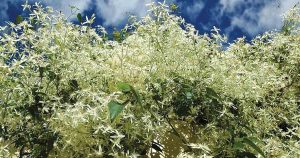By Lachlan Turner
Several of the wattle family have an extended flowering period commencing in mid autumn through to near the end of spring. One such plant is Prickly Moses (Acacia ulicifolia), which, as its name implies, has rigid narrow “leaves” with a sharp spike at the end.
It has been observed that the spiky nature of the foliage allows small birds a measure of protection from larger aggressive birds that have a tendency to attack them.
This variety of Acacia, mainly flowering from June to September, is often overlooked due to its small inconspicuous flowers found at the end of a short stalk spaced intermittently along the stiff branchlets. The new flower bud appears as a cluster of small yellow balls collected together in a spherical shape at the end of the stalk, this spherical shape being about 5 – 10mm across.
The small balls open out to create the fluffy cream flower as seen in the adjacent images. They can be up to 15mm across.
When the flowers mature they slowly turn a somewhat unattractive brown colour before dropping off the branchlets.
Another reason why this wattle is often overlooked is due to its low straggly, untidy habit. At times there can be more spent flowers visible than there are new ones. It is not usual for this wattle to grow more than about 1 metre tall and around 1 metre wide.
It can be cultivated in the form of a low hedge being readily propagated by normal seed raising methods and pruned to a more compact shape.
A similar species flowering a couple of months later is the Golden Prickly Wattle (Acacia brownii). This variety has flowers that are a much richer yellow colour than Prickly Moses.






